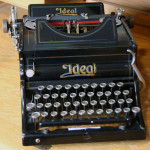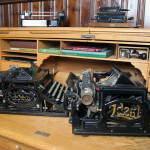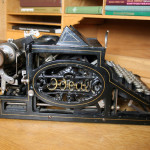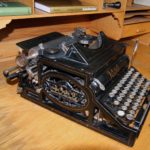- Adler
- Alpina
- American and Armstrong
- Bar-Lock
- Bennett
- Bijou
- Blickensderfer and Niagara
- Brother
- Caligraph
- Chinese typewriter
- Consul
- Continental
- Corona
- Densmore
- Edelmann
- Facit
- Fox
- Frolio
- Geniatus
- Groma, Optima and Combina
- Halda
- Hall
- Hammond
- Hermes
- IBM
- Ideal
- Imperial
- Japanese typewriter
- Jewett
- Kappel
- Kosmopolit
- L.C. Smith & Bros.
- Liliput
- Mercedes
- Merritt
- Mignon
- Mitterhofer
- Noiseless
- Odell
- Oliver
- Olivetti
- Olivetti M1 and M20
- Olivetti portable typewriters
- Olympia
- Pittsburg
- Postal
- Princess
- Rem-Sho
- Remington
- Rheinmetall
- Rofa
- Royal
- Sampo
- Silver Reed
- Smith-Corona
- Smith Premier
- Stoewer
- Torpedo
- Triumph
- Typewriters for blind
- Underwood
- Williams
- Woodstock
- World
- Yost
- Zeta
Seidel & Naumann, Dresden, Germany
The company was founded by Karl Robert Bruno Naumann (1844-1903) in 1868. Erich Seidel joined the company the next year and remained as an owner until 1876. In a short time the company became the biggest producer of sewing machines in Germany. In 1886 the company employed 1000 workers and produced yearly 80 000 sewing machines. Bicycle production started in 1892 and the cycle was named “Germania”. In 1899 the company bought the manufacturing rights of a typewriter designed by the Americans Frank J. Tanner and Edwin Barney. Production started in 1900. Ideal is a front strike typewriter and weighted 17 kgs. A typical sturdy German made typewriter. The logo is molded into the decorated side panels. In model A the side panel is more decorated than in later models. Until 1960 nearly two million typewriters had been produced. In England the marketing name was Bijou. After World War II the company was renamed as “VEB Schreibmaschinenwerke Dresden” and produced a typewriter named Erika. Production ceased in 1991.
- Model C #71079 (1924)
- Ideal
- Model A3 #15089 (1904)
- Ideal #15089



